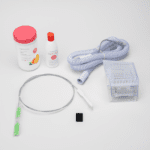Taking hormonal birth control and melatonin together isn’t known to reduce the effectiveness of birth control. But this combination can increase the risk of side effects from melatonin, such as tiredness, dizziness, and headaches.
Because melatonin is a hormone, people who use hormonal birth control methods may worry that melatonin could interfere with their family planning strategy or potentially cause a harmful interaction. We provide details about how melatonin works, how it may relate to reproductive health, potential safety concerns, and other ways to improve your sleep.
How Melatonin Affects the Body
Melatonin plays an important role in your circadian rhythm, the internal fluctuations in your body that encourage you to be awake and alert during the day and sleepy at night. Your brain makes and releases melatonin when it gets dark to signal that it’s time for bed.
Melatonin is also available as a sleep aid. Most melatonin supplements contain a synthetic form of the hormone. Because melatonin is classified as a dietary supplement, you can purchase melatonin without a prescription in the United States, but be sure to follow the recommended dosage.
Taking melatonin supplements may help with a number of sleep-related complaints, including:
- Jet lag
- Certain types of insomnia
- Delayed sleep-wake phase disorder
While melatonin can generally help you fall asleep faster, it may or may not help you stay asleep longer.
Can Melatonin Supplements Affect Birth Control?
There is no evidence that melatonin supplements have a negative impact on the effectiveness of birth control. However, melatonin can interact with other aspects of the reproductive system.
While more research is needed, some evidence suggests that melatonin may affect ovulation, sperm production, and levels of reproductive hormones such as estrogen, progesterone, and testosterone. People trying to become pregnant or experiencing infertility may want to avoid taking melatonin supplements until they can talk to their doctors.
If you are on hormonal birth control, it’s a good idea to check with your doctor before starting any new supplement, including melatonin. While taking melatonin is unlikely to cancel out your birth control method, it will take additional research to fully understand the effects of melatonin on reproductive health.
Other Sleep Supplements That Interact With Birth Control
St. John’s wort is a yellow-flowered plant with a long history of medicinal use. People may take this popular supplement for a number of conditions, including sleep issues.
However, health experts warn about risks associated with St. John’s wort because of interactions with various medications, including birth control pills. St. John’s wort can dampen the effects of hormonal birth control, which could raise the possibility of an unwanted pregnancy.
Other medications can also impact the effectiveness of certain birth control methods. These include types of anti-seizure drugs and HIV medications, as well as specific antibiotic and antifungal drugs.
To find a birth control method that’s right for you, discuss your full medical history and current prescription medications with your doctor. Also, tell your doctor about any supplements you take or are planning on taking.
You should also consult with your doctor before trying any new sleep supplements, especially if you’re taking birth control or another medication. Your doctor can help you determine if the supplement is safe and help you find an alternative sleep aid if needed.
Is It Safe To Take Melatonin With Birth Control?
Hormonal birth control used by women and people who ovulate can increase the body’s production of melatonin. This means that taking melatonin supplements and birth control at the same time may raise the chances of side effects. The side effects of melatonin can include:
- Headache
- Nausea
- Daytime sleepiness
- Dizziness
Melatonin may cause negative interactions when taken with medications that treat conditions such as:
- Blood clotting
- Seizures
- High blood pressure
- Diabetes
Also, keep in mind that quality can vary greatly among different brands of melatonin supplements. The U.S. Food and Drug Administration regulates melatonin as a dietary supplement. Dietary supplements have fewer regulations than other medications, and research has found that the dosage listed on the label doesn’t always match what’s in the bottle.
Alternative Ways to Improve Your Sleep
To help you get better sleep, experts often recommend starting with your behavior. You may be able to improve your sleep hygiene by making basic lifestyle changes, including:
- Getting plenty of exposure to natural sunlight
- Making exercise a regular part of your day
- Avoiding long naps, especially in the evening
- Managing stress levels and finding ways to relax during the day
- Avoiding stimulants like caffeine and nicotine later in the day
A relaxing, consistent bedtime routine is also important for good sleep. Bedtime habits that can improve your sleep include:
- Going to sleep and waking up around the same times every day
- Avoiding large meals and strenuous exercise right before bed
- Relaxing with activities such as reading or meditating
- Avoiding light from screens close to bedtime
It’s common to have trouble falling asleep and staying asleep from time to time, but chronic sleep troubles may be a sign of a sleep disorder or an underlying medical issue. If you experience frequent sleep problems, your doctor can help you get an accurate diagnosis and come up with an effective treatment plan to improve your sleep.
References
Ask the Sleep Doctor
Have questions about sleep? Submit them here! We use your questions to help us decide topics for articles, videos, and newsletters. We try to answer as many questions as possible. You can also send us an email. Please note, we cannot provide specific medical advice, and always recommend you contact your doctor for any medical matters.








































